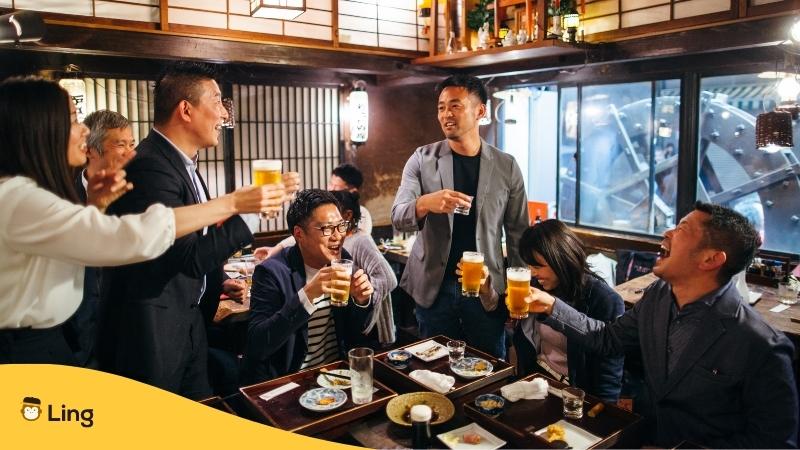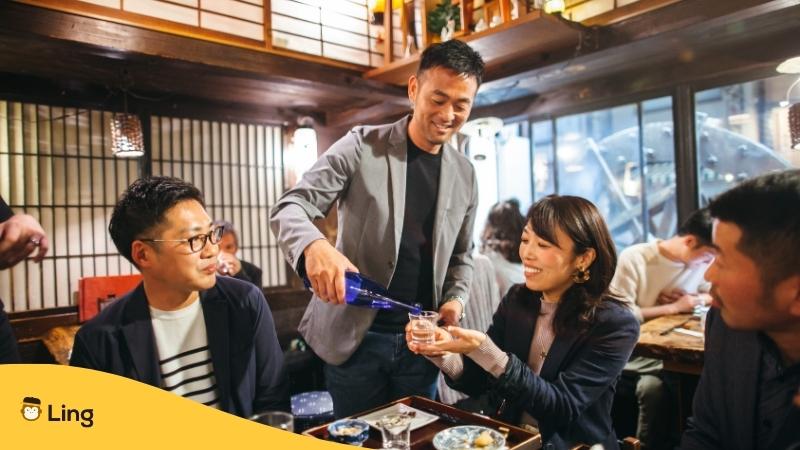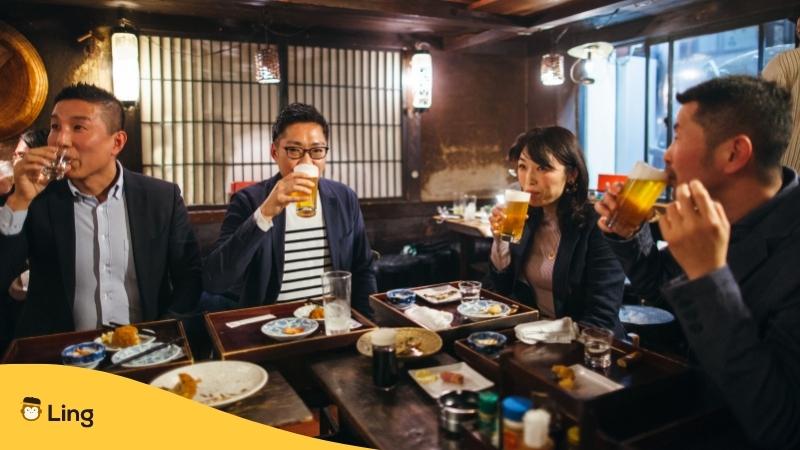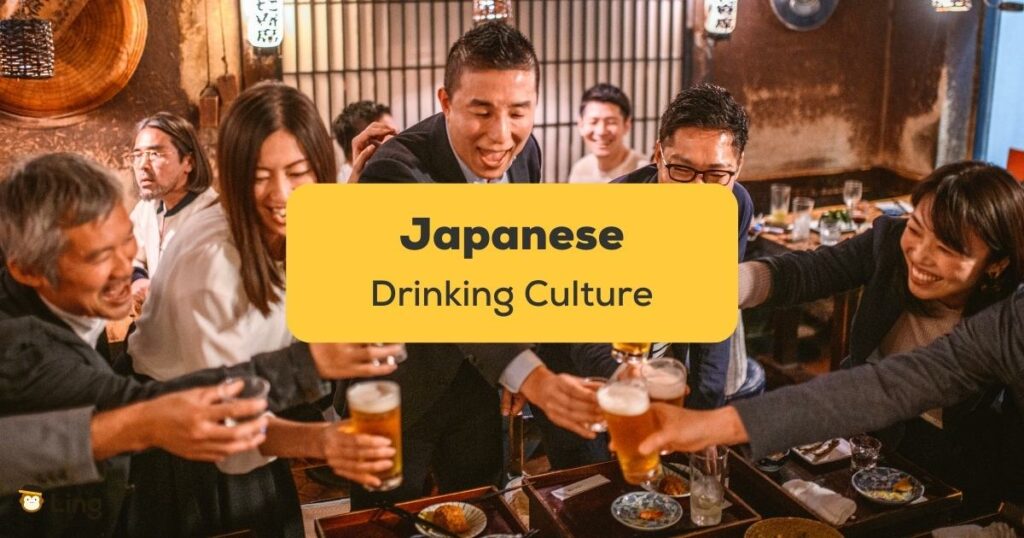Following the clink of glasses, an energetic group of people will shout out Kanpai! (乾杯) with joy, which indicates “cheer!” in English. There is a strong correlation between the Japanese drinking culture and excessive drinking, loud karaoke singing, and wild dancing. Is this how you choose to spend your leisure time? If that’s the case, you’ll find that Japan is a drinker’s paradise.
What Is Japanese Drinking Culture?
Japan’s drinking culture is a social and cultural norm. Among the Japanese, alcohol serves as a bonding and sincere drive. For this reason, the drinking party, also known as 乾杯 (nomikai), is rooted in the culture of most workplaces. As a social aspect of the workplace, employees are expected to participate in nomikai at various levels. These get-togethers are unrelated to business because they are focused on the sociability of the staff as a whole. The student counterpart to the nomikai is called コンパ (konpa).
If you’re going to work in Japan, learn these Japanese social and business etiquettes today to drink alcohol with Japanese people without upsetting them or breaching social patterns.

5 Hacks For You To Enjoy A Night Out With Japanese Locals
Fact #1 Be In Harmony, So Drink The Same
In Japan, drinking is all about connecting with others. In the modern day, beer is the standard beverage with the main course, whereas sake is more commonly associated with starters and smaller dishes. Even though it’s not essential, it’s polite to order the same beverage as the rest of your party. Mainly, In more formal situations, you should refrain from drinking the beverages you usually would. Remember that the purpose of nomikai is to strengthen the team as a whole.
Fact #2 It Isn’t Polite To Drink Before Everyone Else Has A Chance
We know that many people are eager to experience Japanese drinks for the first time when they get the chance. Still, it is considered disrespectful to drink before others in Japanese culture, just as it is to dine before everyone at the table has had a chance to do so.

Fact #3 Do Not Pour Your Own Drink.
No matter how much you adore Japanese beer, you always want more and immediately fill your glass. But, hold on, it’s considered odd to pour one’s own drink in Japanese society. Therefore, when others are seated nearby, you should allow them to refill your glass from their bottle. Remember, hold the glass with both hands and pay attention to their kind offer to indicate that you appreciate their thoughtfulness. Don’t chat or look away when you’re getting your glass filled.
Fact #4 Pour For Older Or Higher In Status
Those who are younger or lower in social status are often the ones to pour drinks for the more senior members of the group first. For example, meetings of business stakeholders need heightened respect for established social orders. Also, in other settings, if there are honored guests, you’ll pour the drink for them first.
Fact #5 Saying “お疲れ様でした” (Otsukare Sama Deshita) At The End Of The Party
“お疲れ様でした” (Otsukare Sama Deshita) is a typical end of nomikai greeting, given when someone is departing during the night. The Japanese word “お疲れ” (otsukare) is translated as “tired.” In socializing among coworkers, the statement shows gratitude for a well-performing job. One of the kindest things you can do for a coworker is to deliver honest acknowledgment that they are exhausted, so they deserve the drinks, relax and enjoy themselves.

How Strict Are Alcohol Laws In Japan?
Regarding alcohol consumption, Japan is remarkable among developed nations in that it allows citizens a great deal of freedom.
Japan has very relaxed rules regarding public drinking. Parks and the railway station are also acceptable locations for drinking, as is the train itself. No matter what time of day, many Japanese passengers on the shinkansen will undoubtedly be seen opening cans of beer as soon as they settle into their seats.
Legal Drinking Age In Japan
The age of legal adults in Japan is 20. Young people under 20 in Japan are not allowed to buy alcohol or use cigarettes.
Occasionally, you can find a lot of alcohol vending machines in Japan. They are activated in the morning and deactivated at 23:00 daily, restricting access to alcoholic drinks by those younger than 20. Concern among Japanese people that alcohol vending machines might encourage underage drinking has led to a decline in their presence outside.
Vocabulary For Japanese Drinking Parties
Here are useful words about drinking in Japanese. Let’s practice!
In Summary
Clearly, even when it comes to enjoying drinking alcohol with Japanese people, there are established norms to follow. Therefore, we hope that this article will assist you in being well-prepared if you ever find yourself at a drinking party with Japanese folks. You’ll have a better time at the drinking party since you’ll be more conscious of some particular etiquette in Japanese culture.
Do you realize that you may maximize your time with your Japanese friends by improving your Japanese language skills? And now we’d like to advise you on the most efficient way to study the language!
Learn Japanese With Ling Now!
As far as recommendations go, Ling is the top pick. Ling has an extensive vocabulary with sample phrases, making it a well-developed language-learning tool that will help you get the most out of your Japanese studies. Furthermore, we provide several entertaining tools, like mini-games, puzzles, and a clever chatbot, to support memorizing new vocabulary and phrases.
Most Japanese learners chose Ling app to help them succeed, so why not join them? Download the Ling App from Google Play Store and Apple App Store now, and prepare to be fluent in Japanese soon!




































































